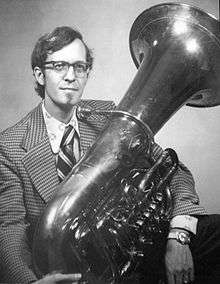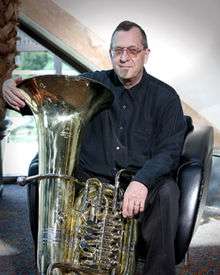R. Winston Morris

Ralph Winston Morris (born 1941 in Barnwell, South Carolina) is an American tubist. He serves as a professor of tuba and euphonium at Tennessee Tech University in Cookeville, Tennessee. Morris is editor of The Tuba Source Book and the Euphonium Source Book.
Morris earned his academic degree in music from East Carolina University in 1962.[1] As the conductor of the Tennessee Tech Tuba Ensemble, he started promoting jazz tuba performance in an ensemble setting as early as 1967.[2] Morris created the first tuba/euphonium ensemble at Tennessee Tech.
The Tennessee Tech Tuba Ensemble has performed under Morris' direction on Bourbon Street and at the New Orleans Jazz Festival, Disney World, the National MENC Conference in Kansas City, the International T.U.B.A. Conference in Austin, Texas, the Kennedy Center in Washington, D.C., and at the Spoleto Festival in Charleston, South Carolina. The ensemble has also performed in Carnegie Hall[3] 7 times, produced 22 commercial recordings—some which have been grammy nominated—and generated more than 600 compositions for the tuba, euphonium and tuba ensemble.[4] Morris put together the first euphonium choir and organized the first recording project for euphonium choir.[5]

Morris studied under William Bell, tuba player for the John Philip Sousa Band.[6] Winston was also a member of the Matteson-Phillips Tubajazz Consort with Rich Matteson, Ashley Alexander, John Allred, Buddy Baker, Harvey Phillips and Daniel Perantoni.[7] As of 2015, he is the tubist for the Brass Arts Quintet.
Morris created and now conducts Symphonia, a tuba/euphonium ensemble made up of professional players. A recent reunion concert billed as Tubas of Mass Destruction, held in 2007 at Tennessee Tech University, included over 100 current and former students from his 40 years of teaching. Throughout his teaching career, Morris has encouraged his students to arrange and compose pieces of music for the ensemble, which was necessary in the early days of the group as there was virtually no repertoire for them to play.[8]
References
- ↑ Michael F. Shaughnessy (November 20, 2007). "An Interview with Winston Morris: Titan of the Tuba!". Education News. Retrieved February 18, 2012.
- ↑ Tennessee Tech University Faculty Profile
- ↑ Carnegie Hall – Tennessee Tech Tuba Ensemble
- ↑ Titan of the Tuba – American Profile
- ↑ Our Company History
- ↑ Dr. Peter Gillie. "The father of modern tuba". xtimeline. Retrieved February 18, 2012.
- ↑ Tap Music
- ↑ International Tuba Euphonium Association